
8 minute read
ON TOP OF THE WORLD
After crisscrossing the globe in the name of Canadian culture, Kardinal Offishall is now using his international ear to call Def Jam home
BY BEN KAPLAN
PHOTOGRAPHY BY JALANI MORGAN
STYLING BY AIMEE ELISE LAPEDUS FOR AL VINTAGE DESIGN @AIMEE_ELISELAPEDUS
During Kardinal’s two-hour trip to the KIND office, he ignores calls from the Junos and from the CEO of Def Jam. Clearly the man is having a moment. One of the all-time most dynamic Canadian performers says that, after ten trips around the world, talent is universal, but good people are all the same. A co-host of Canada’s Got Talent and newly anointed head of global A&R at Def Jam—the label behind, among others, Public Enemy, DMX and Run-DMC—Kardi says that moving between cultures restores his faith in the universal decency of people. Talent doesn’t discriminate. And anyone worth spending time with shares similar traits.
“I love being able to navigate different cities and countries and that’s where I learned that we are all essentially the same,” Kardinal recently told KIND, sitting on our patio high over Toronto and enjoying his perch as a man on the move. “Greatness starts in so many different places, but it always ends up in the same place—and that’s someone’s heart.” Heart is something Kardinal has in spades and after nearly thirty years in the game, he seems to be (once again) reinventing himself. Whether it was his headlining recent performance at OVO Fest when Drake brought together his partners on “Northern Touch,” with a Nelly Furtado assist, or else earning a Canadian Screen Award nomination for his appearance on Run the Burbs, Kardinal remains both humble and ambitious. Proud of his accomplishments, but never settling—always looking to grow.
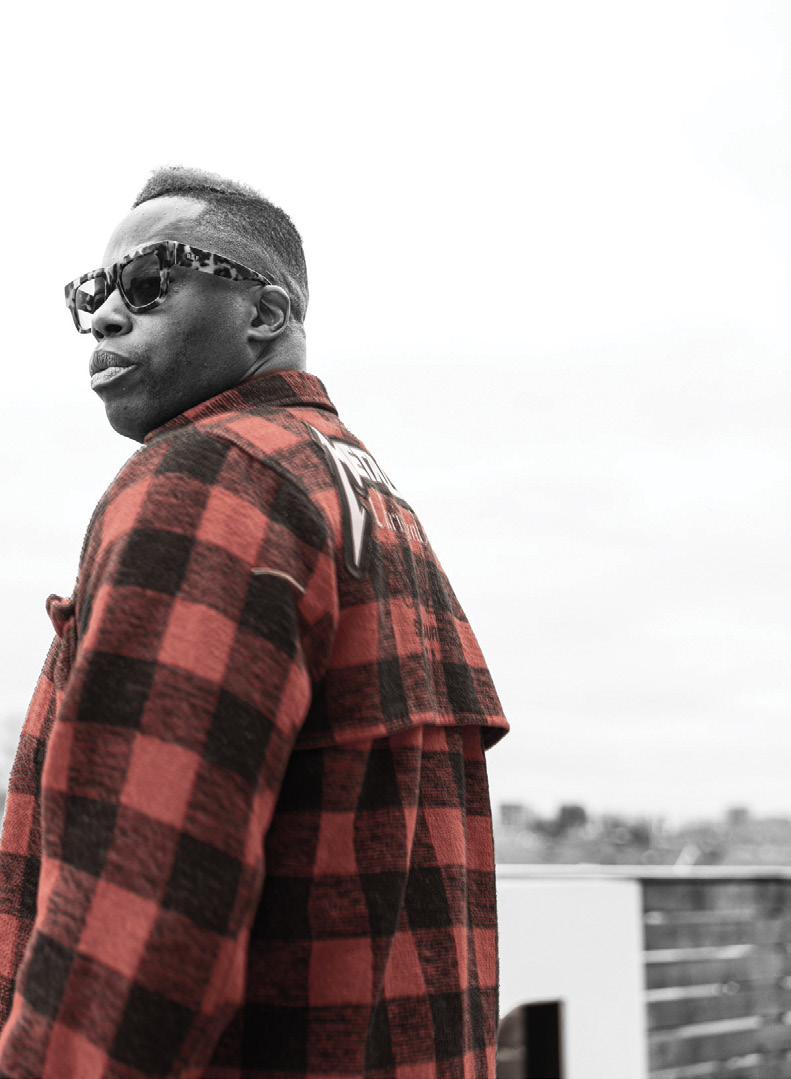

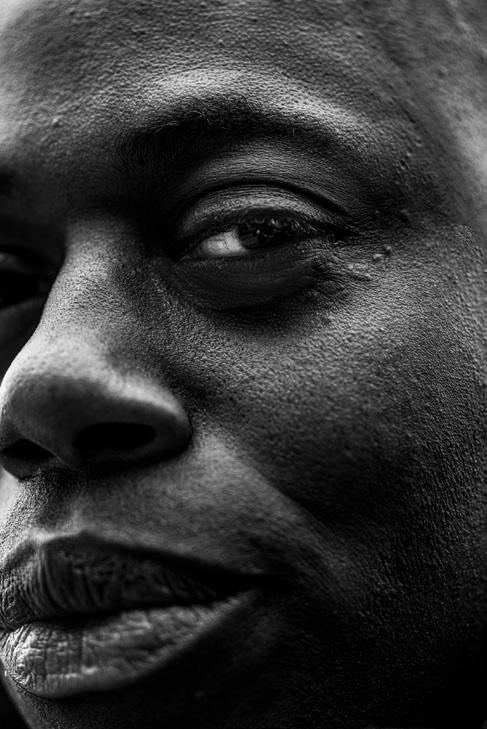
“I live in gratitude,” he says, with a smile. “I’m a forever student, and I want to see myself in a new space, but also us—meaning my community—occupy spaces we had been pushed out of or rejected from. Anything I can do to help develop our landscape across this country is something I most definitely want to do.”
Developing the landscape is something Kardinal will be doing at Def Jam, the label that meant the most to him growing up. At a time when international music is all the rage—from Afrobeats to Reggaeton to the K-pop sensation that is BTS—Kardinal is charged with keeping hip hop’s most influential label up to date. Hailing from Toronto, he says, gives him an edge over nearly anyone maneuvering amongst people across the globe. He’s no stranger to different cultures and feels like his hometown prepares him for the world.
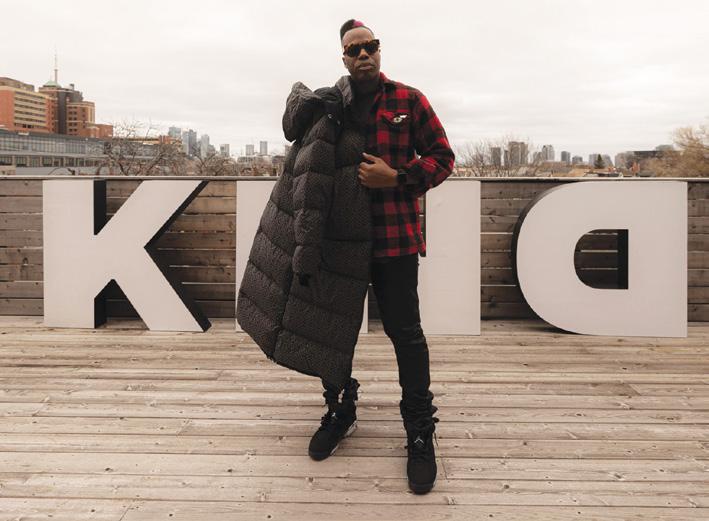
“When I travel to India, it’s not foreign to me. I feel comfortable because in Toronto, multiculturalism isn’t just an aesthetic, it’s something ingrained,” says the hitmaker behind “Dangerous” and “BaKardi Slang.” “Being from Toronto, I can look at a person and understand them, whether they’re from Japan or Nigeria, because I grew up participating in their culture. A lot of people live separate experiences, but different cultures are symbiotic here.”
Kardinal is a living history book of hip hop, art and culture, and travel, for him, is a chance to cop talent, but also promote Black Canadian music abroad. Whether he’s in a Los Angeles boardroom or a Brazilian dancehall, Kardinal says he’s learned the trick about being comfortable worldwide. Wherever he goes, and this includes prime time TV with Howie Mandel or afterparties with Nelly and Drake, he always acts the same way. Kardinal called himself Mr. International when he was still teaching the world to call Toronto T.O. Now he’s doing that job for Def Jam.
“The minute you start worrying about the environment, that’s where things can be misinterpreted or lost in translation, when you focus on the wrong things,” he says. “All I’ve learned through the years of travelling is there’s only one thing I can do and one way to be—your vibe, your energy, that’s all you have if you want someone on the other side of the planet to recognize your greatness.”

RIC FLAIR HAS SOME STORIES TO TELL (AND ONES HE DEFINITELY CAN’T)
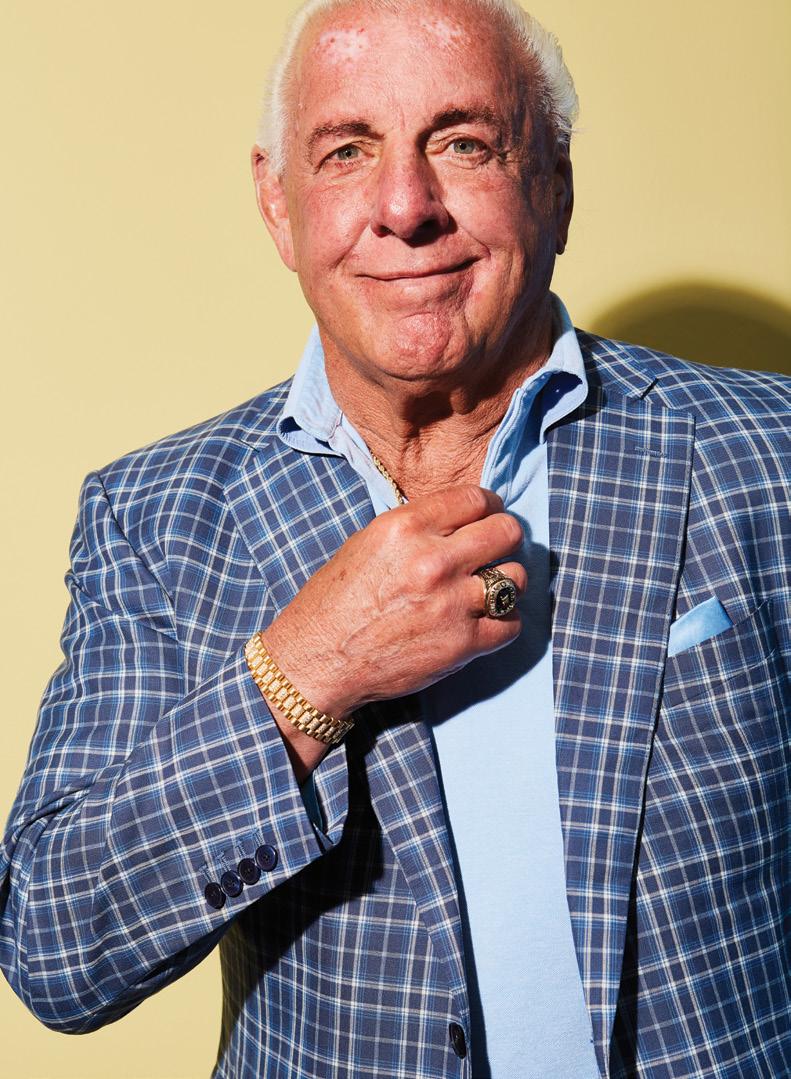
BY ALEX NINO GHECIU
Death, taxes, and Ric Flair’s swagger. Those are the only certainties in this world. The jet-flyin’, limousine-ridin’ wrestling legend tells me he let out his first “woo!” in 1974; since then he’s styled and profiled his way to sixteen world titles and five decades of flex-god status, leaving a path of envy and awe everywhere he goes. At 73, despite numerous health scares, he’s still just as big-talking and culturally relevant as ever, relishing his current standing as hip-hop’s favourite muse; his name often gets dropped in songs as a shorthand for profligacy and excess. “I’m the founder of swag!” he proclaims over the phone. And that’s not to be confused with schwag. For his latest conquest, The Nature Boy is strutting straight into the legal market with Ric Flair Drip, his inaugural cannabis line, named after the 2017 trap song about him by Offset, 21 Savage and Metro Boomin. Here, we chat with Flair about partying in Toronto, smoking with the Migos and his untameable ego.
ANG: You keep getting name-dropped in songs, whether it’s Migos or Pusha T or Killer Mike. How do you explain it?
RF: Well, I was the first guy basically that ever wore jewellery. Even Snoop Dogg will tell you that. I’m the founder of swag! It’s kinda like when no one had long hair, I had long hair. And then everybody got long hair. I’m still having a hard time holding these alligators down!
ANG: I see you’re still rocking them “$600 shoes.”
RF: Oh, no, $1800. That was back in the ’80s when they were $600. [Laughs.]
RF: I smoked when I was a kid but I actually had asthma, so I didn’t really smoke that much. And I outgrew it as I got older. But I started to get more attracted to edibles because I was eating Xanax like candy while travelling — just to fall asleep, not because of anxiety. But when you travel from Australia to New Zealand, then New Zealand to Saint Louis, Saint Louis to Atlanta and then Japan in one week, it’s hard to sleep. And Xanax is very addictive, so the edibles helped me get off of Xanax.
ANG: Yeah, Xanax is probably something you shouldn’t mess with. Was cannabis around in locker rooms back in the day?
RF: Everybody had a drug of choice back in the ’80s. It was insanity. Even in the ’90s. Hell, even today!
ANG: What are your current thoughts on the drug war?
RF: We lost a lot of soldiers in my industry from all of that, just the different pharmaceutical drugs. When you’re wrestling 365 days a year, twice on Saturday, twice on Sunday, you’re going to find something to relax on, whether it be 12 beers or smoking a joint or some guys were snorting cocaine. You just had to find a way to relax. And we all did. My choice was liquor, obviously.
ANG: A lot of it, from what I hear!
RF: Somebody compared me to Andre The Giant yesterday. I don’t know about that.
ANG: Yeah, I read that — that you could drink as much as Andre.
RF: Not the case. [Laughs.] I’ve seen Andre drink two half-gallons of wine on a 130-mile drive to wrestle again on a double shot. He was 543 pounds!
ANG: Holy shit! Did you used to drink before matches?
RF: No, no, no, never. But as soon as that was over, I dove in pretty heavy until about 4 a.m., depending on what city I was in. Sometimes 6! [Laughs.]
ANG: Do you have any stories of partying in Toronto back in the day?
RF: I’d have been shut down long ago.
ANG: I know you’re friends with Mike Tyson and I’ve read some interviews where he says cannabis helps him keep his ego in check. Does it have that same effect for you?
RF: Nothing can keep my ego in check! Who do you think you’re talking to? You’re talking to the Rolex-wearin’, limousine-ridin’, jet-flyin’! My ego in check? If anything, it’s getting bigger. Ric Flair Drip, hell yeah!
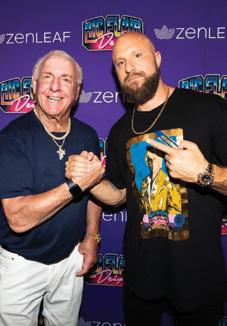
ANG: I know you used to have trouble separating your in-ring persona from your real-life self. I was gonna ask if maybe that’s changed now that you’re older…
ANG: What’s your experience with weed been like?
RF: It’s even worse now! The girls know I’ve got the drip. I’m making new friends every day. They ask, “You got some Ric Flair Drip?” Yup, every trip!
BY BEN KAPLAN
PHOTOGRAPHY BY SIMON ROBERTS FOR SIMONRPHOTO
Charlie Dark—DJ, poet, youth organizer—is my hero. With his message of inclusiveness, beats and empowerment, he’s made running cool and spread love from his homebase in London to Paris, Copenhagen, Toronto, Vancouver, L.A. and Berlin. Dark, awarded the Power of Light award from former British Prime Minister Theresa May, replaces inner-city chaos with inner-city pride, and his Run Dem Crew is now followed across the world. “If the average man in the street realized the power and potential within them, the world would be a different place,” Dark told me, and his mantra is: “Leave your ego at home.”
For sixteen years, he’s brought running to hard-to-reach places and says the pandemic has only brought more people into our sport. “Running is a superpower that lives inside your body,” says Dark.
Ben Kaplan: How do you start to run?
Charlie Dark: Go outside, take your phone and walk. Take pictures for a month. Do that and your body gets comfortable. Then run for a bit. Just a bit. Then walk. Mix it up; eventually, the walking gets shorter and the running gets longer. You run.
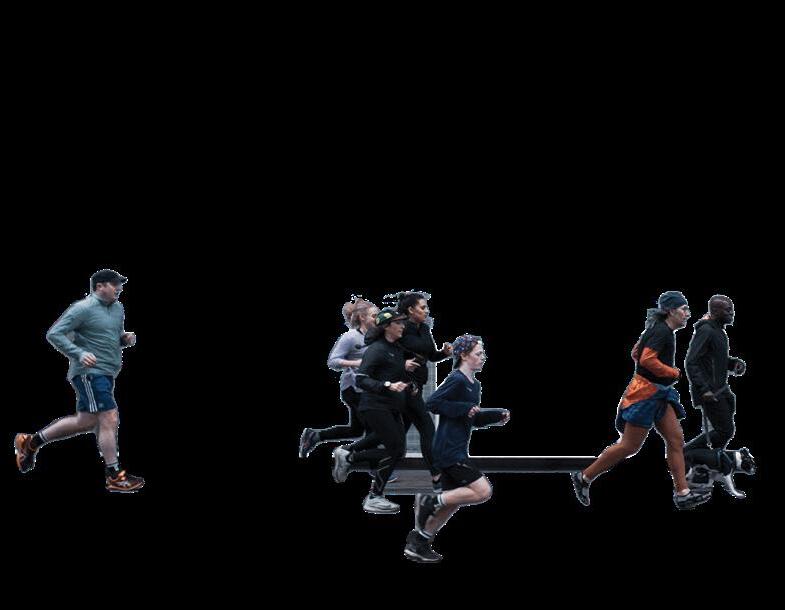
BK: Do you wear a watch or measure your speed and distance?
CD: I measure emotion. How does going outside make you feel? Outside is an exciting place. Outside is where you need to be. We spend too much time inside. I run to flip the way people think.
BK: What do you mean?
CD: Like running is a sign of weakness, something you do in fear. You run away when you’ve done something bad. But let’s reframe it: running is positive, empowering—it brings connection and exploration. We have kids in Bridge the Gap who’ve never been out of their city and we take them to New York for the marathon. There are dreams happening on our runs.
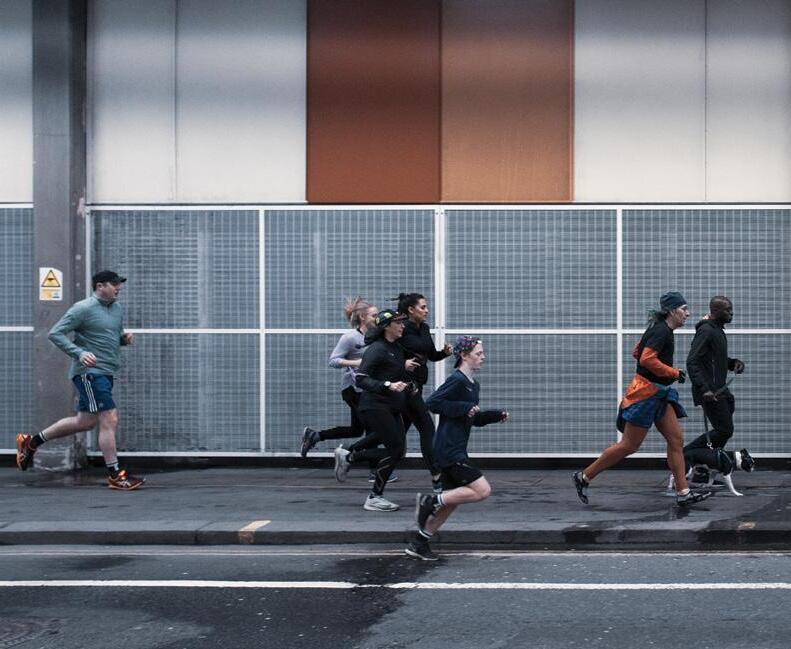
BK: How does running make you feel?
CD: Strong, empowered, liberated. It makes me feel alive and gives me purpose. It also helps keep my head.
BK: How do you find peace on a run?
CD: It teaches you to be present.
BK: You sound like a weed smoker.
CD: Lots of runners smoke weed.
BK: Explain again why anyone can run.
CD: Don’t look at running through the lens of time or distance, but the lens of emotion. It’s about how it makes you feel and the lessons you learn about yourself when you’re out running. That’s how I started my crew. I thought about who I wanted to share that emotion with and what impact I hoped it would have in the world.
BK: Like therapy.
CD: Like meditation.
CD: I reached a point in my life when I needed something and I didn’t know what it was and running was an easy exercise that didn’t require a team, going to a gym or special equipment. It was easily accessible, but I never expected all this.
BK: All what?
CD: Everything changing. I remember running my first ten kilometres in my neighbourhood and feeling elated like I’d reached a landmark, like I conquered something, and from there it didn’t take long to realize that what I found through running I could apply to the rest of my life.
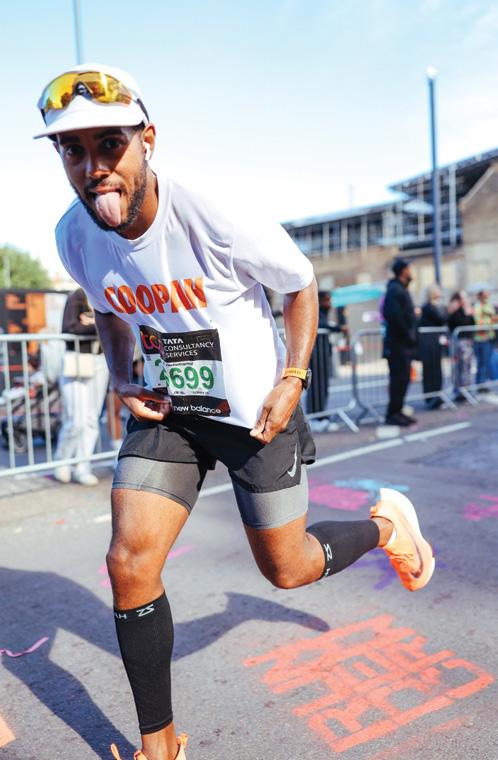
BK: How so?
CD: Breaking large things down into small, manageable chunks.
BK: How did you start?








